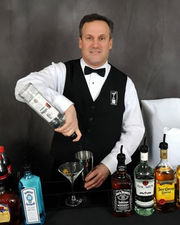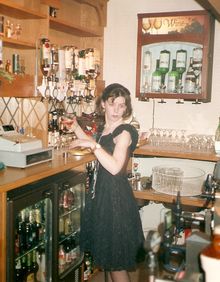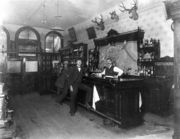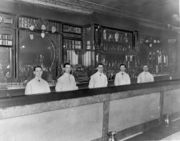Bartender

A bartender (also barkeeper, barkeep, barman, barmaid, or tapster, among other names) is a person that serves beverages behind a bar in a bar, pub, tavern, or similar establishment. This typically includes alcoholic beverages of some kind, such as beer, wine and cocktails, as well as soft drinks or other non-alcoholic beverages. A bartender, in short, "tends the bar". A bartender may own the bar or may be an employee. The term barkeeper may carry a connotation of being the bar's owner.
In addition to their core beverage-serving responsibility, bartenders also:
- take payment from customers (and sometimes the wait staff)
- maintain the liquor, cocktail garnishes, glassware and other supplies or inventory for the bar (though some establishments have barbacks who help with these duties)
In establishments where cocktails are served, bartenders are expected to be able to mix hundreds to thousands of different drinks.[1]
A mixologist is bartender or other person who specializes in the creation of cocktail recipes. The term usually implies special expertise and professionalism.
Bartenders also usually serve as the public image of the bar they tend, contributing to as well as reflecting the atmosphere of the bar. In some establishments focused strictly on the food, this can mean the bartender is all but invisible. On the other extreme, some establishments make the bartender part of the entertainment, expected perhaps to engage in flair bartending or other forms of entertainment, such as those exemplified in the films Cocktail and Coyote Ugly. Some bars might be known for bartenders who serve the drinks and otherwise leave a patron alone, while others want their bartenders to be good listeners and offer counseling (or a "shoulder to cry on") as required. Good bartenders help provide a steady clientele by remembering the favored drinks of regulars, having recommendations on hand for local nightlife beyond the bar, or other unofficial duties. They are sometimes called upon for answers to a wide variety of questions on topics such as sports trivia, directions, or the marital status of other patrons.
In regions where tipping is the norm, bartenders depend on tips for most of their income. Bartenders are also usually responsible for confirming that customers are of the legal drinking age before serving them alcohol.
United Kingdom

In the United Kingdom, bar work is not generally regarded as a long-term profession, but more often as a second occupation, or transitional work for students to gain customer experience or to save money for college fees. As such, it lacks traditional employment protections and therefore has a high turnover.[2]
United States

In some states, bartenders are required to obtain certification as a condition of employment.
The Bureau of Labor Statistics maintains and publishes extensive data on occupations in the United States, including that of bartender. It publishes a detailed description of the bartender's typical duties[1] and employment and earning statistics by those so employed.[3]
References
- ↑ 1.0 1.1 U.S. Department of Labor, Bureau of Labor Statistics (January 2010). "Food and Beverage Serving and Related Workers". Occupational Outlook Handbook. Bulletin 2800 (2010-11 Library ed.). Washington, DC: U.S. Government Printing Office. p. 492. ISBN 9780160843181. http://www.bls.gov/oco/ocos162.htm. Retrieved April 25, 2010.
- ↑ Lucas, Rosemary (2004). Employment relations in the hospitality and tourism industries. Routledge. pp. 27–42. ISBN 9780415297127. http://books.google.co.uk/books?id=PbFmohPo-38C. Retrieved 26 April 2010.
- ↑ U.S. Department of Labor, Bureau of Labor Statistics (May 4, 2009). "35-3011 Bartenders". Occupational Employment and Wages, May 2008. http://www.bls.gov/oes/current/oes353011.htm. Retrieved April 26, 2010.
|
|||||||||||||||||||||||||||||||||||||||||||||
